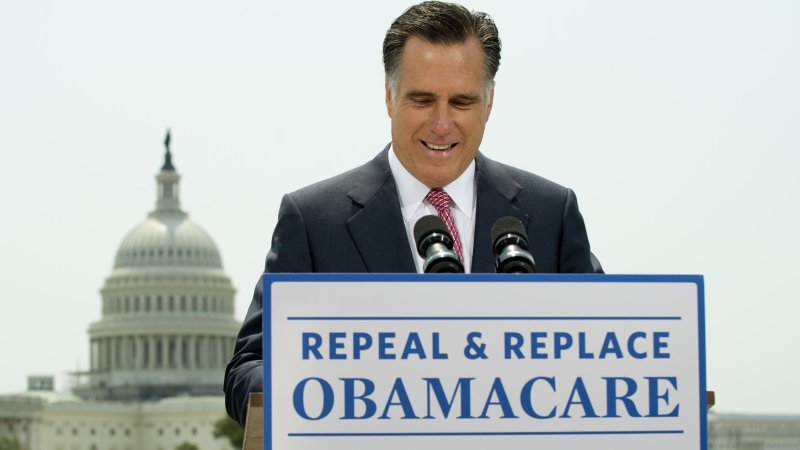Republican presidential candid Mitt Romney delivers remarks on the Affordable Care Act, President Obama's health care reform bill, after the Supreme Court upheld a majority of the law, in Washington, D.C. on June 28, 2012. UPI/Kevin Dietsch |
License Photo
WOLFEBORO, N.H., July 5 (UPI) -- Likely Republican presidential nominee Mitt Romney reversed his depiction of the U.S. healthcare mandate, aligning with conservative voices who called it a tax.
"The majority of the court said it's a tax and therefore it's a tax," Romney said in a hastily arranged interview with CBS News on the Fourth of July. "They have spoken. There's no way around that."
He later repeated his assertion to CNN after an Independence Day parade in the resort town of Wolfeboro, N.H., beside Lake Winnipesaukee, where Romney has an estate.
"Supreme Court is the final word, right? The highest court in the land? They said it's a tax didn't they?" he said. "So it's a tax, of course, if that's what they say it is."
His about face came two days after both his senior adviser and chief spokesman both said Romney did not believe the mandate should be called a tax, even though Chief Justice John Roberts said in the court's majority opinion June 28 the mandate could be "reasonably characterized as a tax."
Adviser Eric Fehrnstrom told MSNBC Monday Romney "disagrees with the court's ruling that the mandate was a tax."
Romney -- who as Massachusetts governor signed a healthcare-reform law in 2006 with an individual mandate that's almost identical to the mandate in the Affordable Care Act -- "believes that what we put in place in Massachusetts was a penalty, and he disagrees with the court's ruling that the mandate was a tax," Fehrnstrom said.
"He disagreed with the ruling. He disagreed with the findings of the ruling. He disagreed with the logic that supported those findings. He said that he agreed with the dissent, which was written by Justice [Antonin] Scalia, and the dissent clearly stated that the mandate was not a tax," Fehrnstrom said.
Pressed to make clear that Romney believed the levy should be called "a penalty or a fee or a fine" but not a tax, Fehrnstrom told MSNBC, "That's correct."
Republican leaders -- led by House Speaker John Boehner, R-Ohio, and Senate Minority Leader Mitch McConnell, R-Ky. -- accused Obama on Sunday morning talk shows of raising taxes on middle-class Americans with the mandate, something Obama promised never to do.
Romney campaign spokeswoman Amanda Henneberg said Monday the campaign agreed with Fehrnstrom on the mandate, but gave the message a twist.
"The federal individual mandate in Obamacare is either a constitutional tax or an unconstitutional penalty," she said. "Gov. Romney thinks it is an unconstitutional penalty. What is President Obama's position?"
In shifting his position, Romney told CBS Wednesday: "I said that I agreed with the dissent and the dissent made it very clear that they felt it was unconstitutional. But the dissent lost. It's in the minority. And so now the Supreme Court has spoken, and while I agreed with dissent, that's taken over by the fact that the majority of the court said that it's a tax and therefore it is a tax."
The Obama campaign seized on Romney's latest remarks.
"Mitt Romney contradicted his own campaign, and himself," spokesman Danny Kanner told The Wall Street Journal.
"He contradicted himself by saying his own Massachusetts mandate wasn't a tax -- but, Romney has called the individual mandate he implemented in Massachusetts a tax many times before. Glad we cleared all that up."
The Obama campaign told The New York Times: "First, he threw his top aide, Eric Fehrnstrom, under the bus by changing his campaign's position. Second, he contradicted himself by saying his own Massachusetts mandate wasn't a tax."















